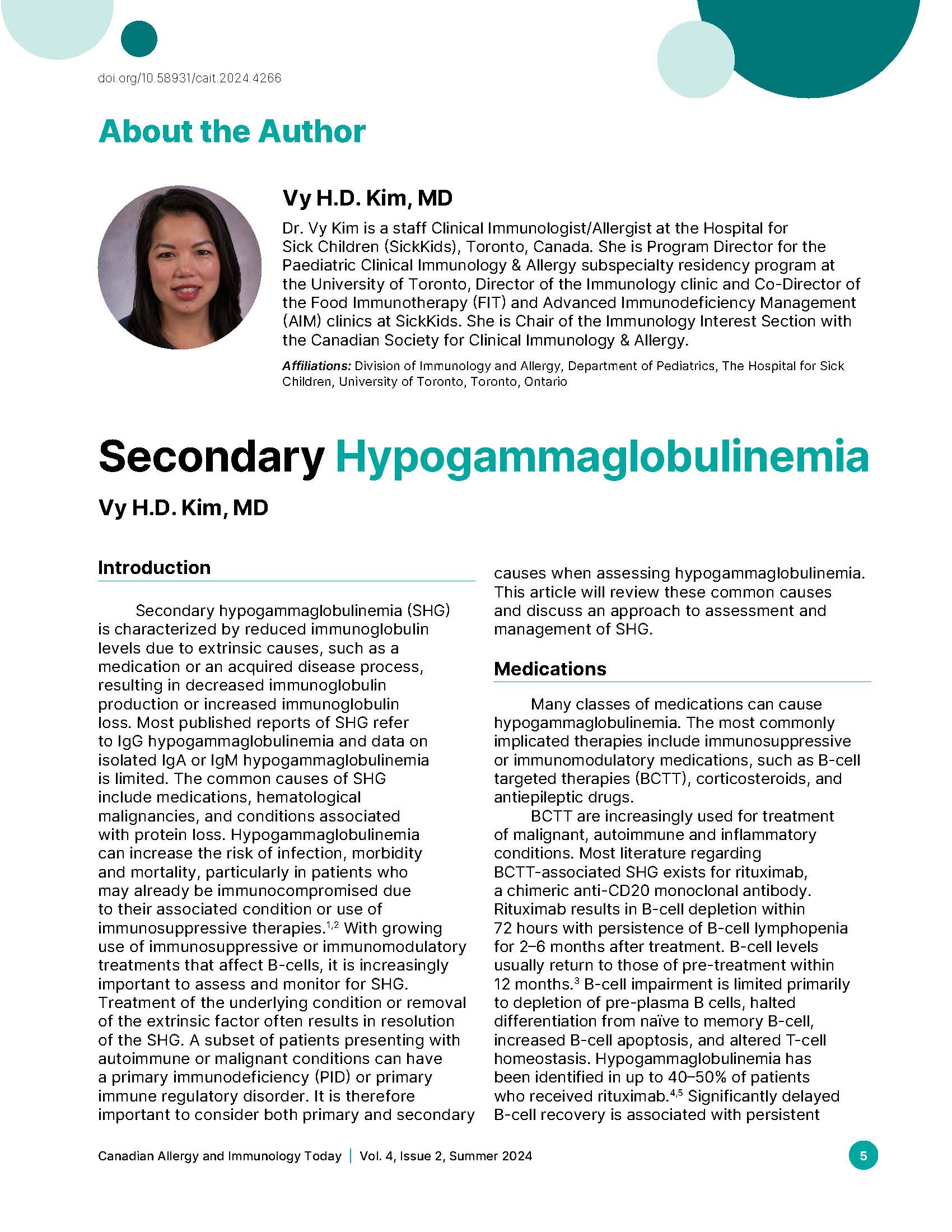Secondary Hypogammaglobulinemia
DOI:
https://doi.org/10.58931/cait.2024.4266Abstract
Secondary hypogammaglobulinemia (SHG) is characterized by reduced immunoglobulin levels due to extrinsic causes, such as a medication or an acquired disease process, resulting in decreased immunoglobulin production or increased immunoglobulin loss. Most published reports of SHG refer to IgG hypogammaglobulinemia and data on isolated IgA or IgM hypogammaglobulinemia is limited. The common causes of SHG include medications, hematological malignancies, and conditions associated with protein loss. Hypogammaglobulinemia can increase the risk of infection, morbidity and mortality, particularly in patients who may already be immunocompromised due to their associated condition or use of immunosuppressive therapies. With growing use of immunosuppressive or immunomodulatory treatments that affect B-cells, it is increasingly important to assess and monitor for SHG. Treatment of the underlying condition or removal of the extrinsic factor often results in resolution of the SHG. A subset of patients presenting with autoimmune or malignant conditions can have a primary immunodeficiency (PID) or primary immune regulatory disorder. It is therefore important to consider both primary and secondary causes when assessing hypogammaglobulinemia. This article will review these common causes and discuss an approach to assessment and management of SHG.
References
Monleón Bonet C, Waser N, Cheng K, et al. A systematic literature review of the effects of immunoglobulin replacement therapy on the burden of secondary immunodeficiency diseases associated with hematological malignancies and stem cell transplants. Expert Rev Clin Immunol. 2020;16(9):911-21.
Lichvar AB, Ensor CR, Zeevi A, et al. Detrimental association of hypogammaglobulinemia with chronic lung allograft dysfunction and death is not mitigated by on-demand immunoglobulin G replacement after lung transplantation. Prog Transplant. 2019;29(1):18-25.
Kimby E. Tolerability and safety of rituximab (MabThera®). Cancer Treat Rev. 2005;31(6):456-73.
Roberts DM, Jones RB, Smith RM, et al. Rituximab-associated hypogammaglobulinemia: Incidence, predictors and outcomes in patients with multi-system autoimmune disease. J Autoimmun. 2015;57:60-5.
Labrosse R, Barmettler S, Derfalvi B, et al. Rituximab-induced hypogammaglobulinemia and infection risk in pediatric patients. J Allergy Clin Immunol. 2021;148(2):523-32.e8.
Tieu J, Smith RM, Gopaluni S, et al. Rituximab associated hypogammaglobulinemia in autoimmune disease. Front Immunol. 2021;12:671503.
Kampouri E, Walti CS, Gauthier J, et al. Managing hypogammaglobulinemia in patients treated with CAR-T-cell therapy: key points for clinicians. Expert Rev Hematol. 2022;15(4):305-20.
Wirsum C, Glaser C, Gutenberger S, et al. Secondary antibody deficiency in glucocorticoid therapy clearly differs from primary antibody deficiency. J Clin Immunol. 2016;36(4):406-12.
Kawano T, Matsuse H, Obase Y, et al. Hypogammaglobulinemia in steroid-dependent asthmatics correlates with the daily dose of oral prednisolone. Int Arch Allergy Immunol. 2002;128(3):240-3.
Perrott S, Macleod A. Associations between antiepileptic use and hypogammaglobulinaemia: findings from a population-based case-control study using data linkage. J Neurol Neurosurg Psychiatry. 2022;93(9):e2.
Na I, Buckland M, Agostini C, et al. Current clinical practice and challenges in the management of secondary immunodeficiency in hematological malignancies. Eur J Haematol. 2019;102(6):447-56.
Karakulska-Prystupiuk E, Dwilewicz-Trojaczek J, Drozd-Sokołowska J, et al. Prevalence of hypogammaglobulinemia and its management with subcutaneous immunoglobulin supplementation in patients after allogeneic hematopoietic stem cell transplantation—a single-center analysis. Ann Hematol. 2021;100(12):3007-16.
Frangoul H, M, Frangoul H, Min E, et al. Incidence and risk factors for hypogammaglobulinemia in pediatric patients following allo-SCT. Neoplasia. 2013;48(11):1456-59.
Florescu DF, Kalil AC, Qiu F, et al. What Is the impact of hypogammaglobulinemia on the rate of infections and survival in solid organ transplantation? A meta‐analysis. Am J Transplant. 2013;13(10):2601-10.
Inoki Y, Nishi K, Sato M, et al. The association between hypogammaglobulinemia severity and infection risk in rituximab-treated patients with childhood-onset idiopathic nephrotic syndrome. Pediatr Nephrol. 2023;38(2):451-60.
Ottaviano G, Marinoni M, Graziani S, et al. Rituximab unveils hypogammaglobulinemia and immunodeficiency in children with autoimmune cytopenia. JACI (Cambridge, MA) 2020;8(1):273-82.
Sogkas G, Dubrowinskaja N, Adriawan IR, et al. High frequency of variants in genes associated with primary immunodeficiencies in patients with rheumatic diseases with secondary hypogammaglobulinaemia. Ann Rheum Dis. 2021;80(3):392-9.
Ar MC, El Fakih R, Gabbassova S, et al. Management of humoral secondary immunodeficiency in hematological malignancies and following hematopoietic stem cell transplantation: Regional perspectives. Leuk Res. 2023;133:107365.
Patel SY, Carbone J, Jolles S. The expanding field of secondary antibody deficiency: causes, diagnosis, and management. Front Immunol. 2019;10:33.
Bourassa‐Blanchette S, Knoll G, Tay J, et al. A national survey of screening and management of hypogammaglobulinemia in Canadian transplantation centers. Transpl Infect Disease. 2017;19(4).
Otani IM, Lehman HK, Jongco AM, et al. Practical guidance for the diagnosis and management of secondary hypogammaglobulinemia: A Work Group Report of the AAAAI Primary Immunodeficiency and Altered Immune Response Committees. J Allergy Clin Immunol. 2022;149(5):1525-1560.
Jolles S, Michallet M, Agostini C, et al. Treating secondary antibody deficiency in patients with haematological malignancy: European expert consensus. Eur J Haematol. 2021;106(4):439-49.
Duraisingham SS, Buckland M, Dempster J, et al. Primary vs. secondary antibody deficiency: clinical features and infection outcomes of immunoglobulin replacement. PloS one 2014;9(6):e100324.
Public Health Agency of Canada. Immunization of immunocompromised persons: Canadian Immunization Guide. 2018; Available at: https://www.canada.ca/en/public-health/services/publications/healthy-living/canadian-immunization-guide-part-3-vaccination-specific-populations/page-8-immunization-immunocompromised-persons.html#a13. Accessed June 15, 2024.

